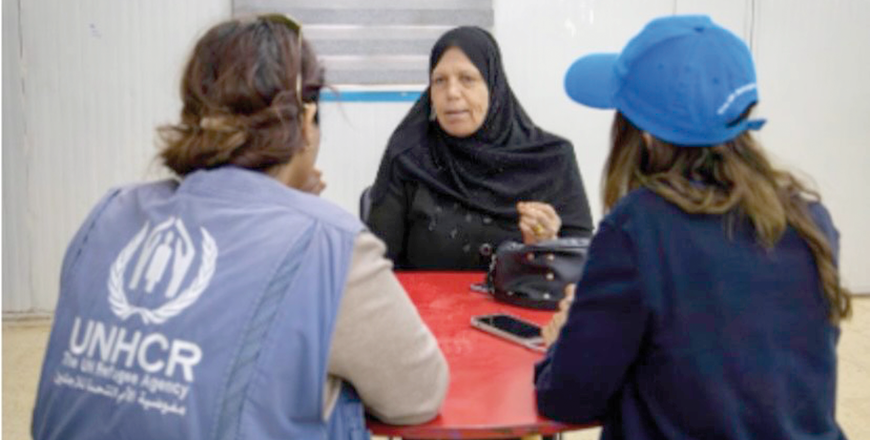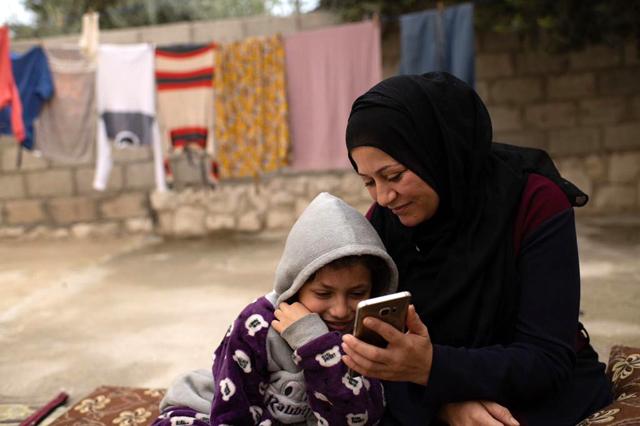You are here
Cash assistance provided to over 30,000 vulnerable refugee households in May — UNHCR
By Mays Ibrahim Mustafa - Jun 18,2023 - Last updated at Jun 18,2023

As of May 31, 2023, there were 740,762 refugees registered with UNHCR in Jordan, of whom 81.7 per cent live outside camps, and 46.3 per cent are under the age of 18, according to the agency’s operational update issued in May (Photo courtesy of UNHCR)
AMMAN — June’s Jordan funding update issued by UNHCR, the UN Refugee Agency, shows that the agency has obtained 31 per cent of its $390.1 million funding requirements for 2023 so far.
As of May 31, 2023, there were 740,762 refugees registered with UNHCR in Jordan, of whom 81.7 per cent live outside camps, and 46.3 per cent are under the age of 18, according to the agency’s operational update issued in May.
These include 660,022 Syrians, 61,026 Iraqis, 12,771 Yemenis, 5,171 Sudanese and 587 Somalis, while the remaining 1,185 are from other nationalities, the report showed.
“At a critical juncture of decreasing humanitarian funding, UNHCR, as the refugee response coordinator, continues to reinforce advocacy efforts for sustained donor support to the refugee response,” the report stated.
Cash assistance
“Cash continues to provide a lifeline for many vulnerable refugees who are unable to make ends meet even if they earn some income through work,” the report said.
The operational update indicated that UNHCR provided regular cash assistance for basic needs for over 30,000 vulnerable refugee households in May.
The agency also “provided urgent cash assistance to around 170 refugee families who faced imminent challenges such as detention and evictions, and to an additional nearly 600 severely vulnerable urban refugees who could not cover their medical bills”, the report added.
Education
Following an agreement with UNHCR, Al Yarmouk University in May announced that refugee students, regardless of origin, would be exempted from international fees at the university, and are instead classified under the same fee schedule as Jordanian students, the report stated.
After Al Yarmouk University’s announcement, UNHCR launched a series of roundtable meetings with public universities in northern Jordan as part of its efforts to implement its “15by30” target, which aims to increase the enrollment of refugee students at higher education institution to 15 per cent by 2030, according to the report.
“In May, around 860 young refugees and Jordanians accessed UNHCR-supported Connected Learning Hubs across Jordan which serve as both online and offline educational platforms,” it continued.
Complementary pathways
The report showed that around 900 refugees left Jordan and resettled in other countries in May, and, “to UNHCR’s knowledge, over 160 individuals had left Jordan through various pathways such as educational opportunities, employment schemes, or family reunification”.
In 2023, over 950 individuals, accounting for 80 per cent of UNHCR’s annual target of 1,200 cases, have so far been assisted in “accessing pathways, through counselling, referral, or travel formalities”, it stated.
UNHCR is continuing efforts to promote complementary pathways for refugees through bilateral discussions with partners as well public and private sector representatives in receiving countries, the report said.
“The discussions focus on highlighting potential skill sets of the refugee population, brainstorming ways to streamline awareness raising and support for refugees and encouraging the engagement of partners working in livelihood sector,” it noted.
In-camp settings
The report said that the Syrian Refugee Affairs Directorate (SRAD), UNHCR and its partners are currently working on renovating rain-damaged shelters and infrastructure following heavy precipitation that caused flooding in some areas of Azraq camp in late May.
“In May, the production capacity of the solar plant in Zaatari fell to 50 per cent from 60 per cent in previous months due to a fault in another coil inverter. UNHCR expects to receive new parts for all the faulty inverters later this year from its manufacturer abroad,” the report added.
The report also noted a “significant increase” in water demand in Zaatari and Azraq refugee camps, “partially due to the rise in temperature and households irregularly connecting to the water network”.
The increase in water requirements seen in both camps and the neighbouring Jordanian communities is expected to be addressed through drilling new boreholes, the report said.
Related Articles
AMMAN — As winter approaches, UNHCR, the UN Refugee Agency in Jordan, has started distributing one-off winter cash assistance for refugees a
AMMAN — UNHCR, the UN Refugee Agency, has distributed emergency cash assistance to approximately 39,000 refugee families in August to help t
AMMAN — UNHCR, the UN Refugee Agency, has received no funding for the 2022 winter assistance programme.


















